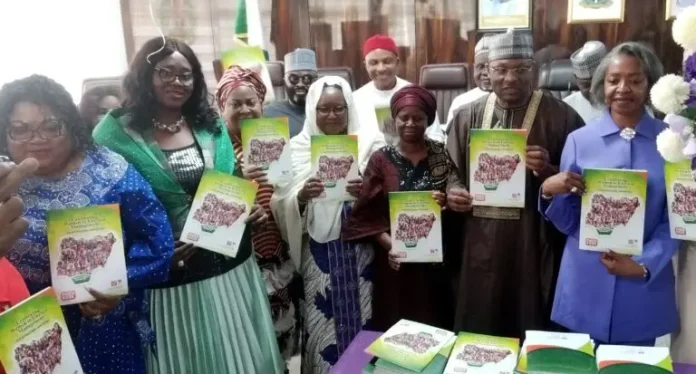The Independent National Electoral Commission (INEC), has urged the National Assembly to introduce affirmative action to address low level of gender representation in elective positions nationwide.
This, the commission said, should be part of the ongoing national assembly electoral reforms.
INEC Chairman, Prof. Mahmood Yakubu stated this at an event “Celebrating Women in Election Management,’’ organised by the commission to commemorate the International Women’s Day (IWD), in Abuja on Friday.
The main theme of the 2024 celebration is “Invest in Women: Accelerate Progress” while the campaign theme is: “Inspire Inclusion”.
Yakubu said that INEC was aware of the concerns raised by Nigerians about the low level of gender representation in elective positions nationwide.
“The commission shares this concern and we have consistently been urging political parties to redress the obvious under-representation of women, youths and persons with disability by nominating more of them as candidates for elections.
“The national assembly should introduce affirmative action as part of the electoral reforms that will ensure greater representation of women, youths and persons with disabilities in elective offices nationwide.
“In the weeks ahead, the commission will engage with the Senate and House of Representatives Committees on Electoral Matters on this and other areas of reforms,’’ he said.
Yakubu said that INEC is delighted to celebrate the IWD as a practical affirmation of its commitment to deepening gender equality, representation, relevance, empowerment and a sense of belonging.
He said that inclusion had been a focal area of INEC commitment covering gender, youths and persons with disabilities.
He said that INEC had since developed, validated and dutifully implementing its gender policy in a practical way.
“It is not by coincidence that the two successive secretaries to the commission are women.
“Furthermore, the present commission deliberately created a whole Department of Gender and Inclusivity in 2021, dedicated to the promotion of inclusive representation in the workplace and the electoral process.
“Today, out of 24 Departments and Directorates at the commission’s Headquarters, 11 (representing 46 per cent) are headed by women.
“We also have women serving as administrative secretaries in our state offices and heads of various departments at state levels.
“There is also no state in Nigeria without women serving as Electoral Officers (EOs) in charge of our local government offices,’’ Yakubu said.
Prof. Kunle Ajayi , the INEC National Commissioner and Chairman, Outreach and Partnership Committee, said that INEC under Yakubu remained committed to electoral inclusion of women.
Ajayi said the commission was aware of abysmal under representation of women in active politics and appointed positions, both at national grassroots levels.
This, according to him, has been an issue of great concern to the commission in spite series of targeted interventions to ensure equal gender participation and representation in the electoral process.
He enumerated various policies, actions and programmes by INEC to promote gender inclusion in the election management process.
“Now, INEC is looking at the more scientific and data base approach in addressing gender and improving women participations in the electoral space.
“To this end, the commission is very open to actionable recommendations to our versatile members of staff.
“We also welcome more productive collaborations and engagements with other development partners in our quest to further advance gender equality and women empowerment in our society,’’ he said.
On her part, Secretary to the Commission, Mrs Rose Oriaran-Anthony, said the event was a pointer to the collective recognition of the contributions and commitment of women toward improving electoral process, especially as leaders in the public service.
Oriaran-Anthony said the photo-book served as a visual tribute to women’s leadership and catalyst for change, sparkling conversations, fostering empowerment and progress toward a more equitable and just society.
“Within the pages of this remarkable publication, we are presented with a visual chronicle of the indomitable spirit and unwavering dedication of women who have played pivotal roles in shaping the electoral landscape of our nation.
“Their stories are not just tales of triumph but testaments of resilience, courage, dedication and a steadfast commitment to public service.
“Each photograph captured within these pages serves as a selfless and poignant reminder of the transformative power that is wielded by women in leadership positions.
“Their presence symbolises that beacon of hope, the flicker of light illuminating the path toward gender equality, inclusivity, and meaningful and impactful participation in governance,’’ she said.
The highlight of the occasion was the unveiling of a Plague and Photo Book of women, who had contributed to expansion of women participation in elective positions, advancement of democracy and devilment in Nigeria.
The News Agency of Nigeria (NAN) reports that the plague and Photo Book was produced by The Electoral Hub in collaboration with INEC Gender and Inclusivity Department.
There was knowledge and experience sharing session by past and present management staff of INEC, including national commissioners, Mrs May Abamuche-Mbu and Prof. Rodah Gumus, as well as former national commissioner, Hajia Amina Zakari .
Others included Resident Electoral Commissioner, Mrs Toyin Babalola; retired directors, Regina Omo-Agege, and Blessing Obidekwu.
Yakubu, thereafter, unveiled the INEC Crèche, built and equipped for nursing mothers working in the commission. (NAN)
By Emmanuel Oloniruha




